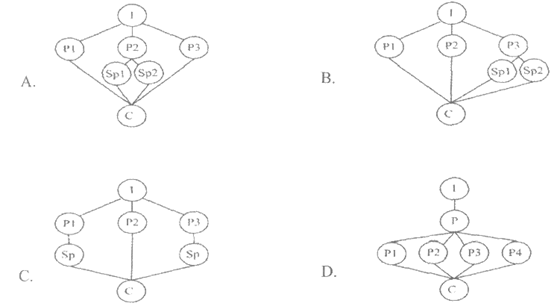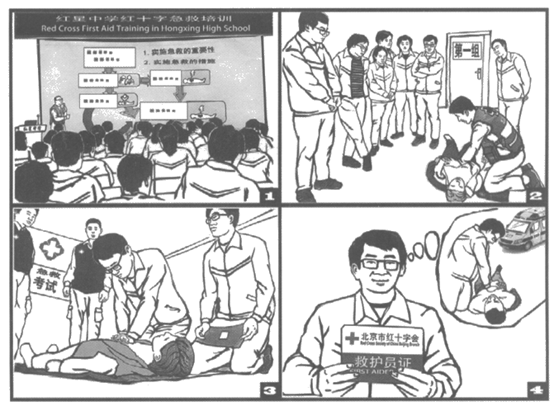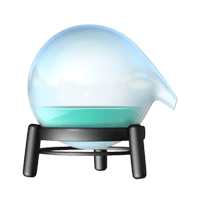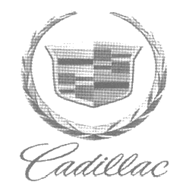本试卷共120分。考试时长100分钟。
第一部分:知识运用(共两节,45分)
第一节 语法填空(共10小题;每小题1.5分,共15分)
阅读下列短文,根据短文内容填空。在未给提示词的空白处仅填写1个适当的单词,在给出提示词的空白处用括号内所给词的正确形式填空。
A
I gave a dress to my granddaughter Anne for her birthday. With a pause at the dress, she smiled lovingly at me and __1______ (tell) me it was beautiful. I was happy that she liked it. One day, passing Anne’s bedroom, I heard her talking __2______ the phone. “My grandma gave me this very pink dress,” she said. “I really appreciate it, but who wears pink these days?” I stood there in awkward silence. Then I walked away, __3______ (pretend) not to have heard anything.
B
The World Health Organization has said the novel coronavirus (COVID-19) does not spread as __4______ (effective) as flu. As the WHO gathers more data, the organization understands more about the novel coronavirus, __5______ causes more severe disease than seasonal flu. At the moment, there is no specific treatment for the new virus. Globally, about 3.4 percent of people with reported COVID-19 cases have died. In comparison, seasonal flu generally kills far __6______ (few) than 1 percent of those infected (感染).
C
As we live in social groups, there __7______ (be) many benefits of friendship that we can enjoy. Generally speaking, close friendships have three “fruits”: they may comfort the heart, advise the head and help us achieve the goals we set for ourselves. Through friendship, we can become happier, wiser, and more __8______ (satisfy) humans. It should be pointed that __9______ (enjoy) the company of a crowd is not the same as being with friends. So friends should be carefully chosen __10______ relationships should be well developed.
第二节 完形填空(共20小题;每小题1.5分,共30分)
阅读下面短文,掌握其大意,从每题所给的A、B、C、D四个选项中,选出最佳选项。
The Deep Roots
When I was growing up, I had an old neighbor named Dr. Gibbs. He didn’t look like any __11____ I’d ever known. Every time I saw him, he wore __12____ and a straw hat. I remember him as someone who was a lot __13______ than most of the adults in our community.
When Dr. Gibbs wasn’t __14______ lives, he was planting trees. His house sat on ten acres, and his life’s goal was to make it a__15__.
The good doctor had some __16____ theories concerning plant care and growth. He __17__watered his new trees, which flew in the face of conventional __18__. Once I asked why. He said that watering plants spoiled (宠坏) them so that each __19____ would grow weaker and weaker. So you have to make things __20____ for them and weed out the weaker trees early on. He talked about how watering trees made for __21____ roots, and how trees that weren’t watered had to grow deep roots in __22____ of water. I took him to mean that deep roots were to be treasured.
He planted an oak and, instead of watering it every morning, he __23____ it with a rolled-up newspaper. Smack! Slap! Pow! I asked him why he did that, and he said it was to get the tree’s __24__.
Dr. Gibbs passed away a couple of years after I left home. Every now and again, I walked by his house and looked at the trees that I’d __25____ him plant some twenty-five years ago. They’re extremely tall, big and strong since they have deep roots now. However, the trees in my garden swung in a cold wind although I had __26____ them for several years.
It seems that __27____ benefit these trees in ways comfort and ease never could. I stood there deep in thought.
Every night before I go to bed, I check on my two sons. I stand over them and watch their little bodies, the __28____ and falling of life within. I often pray for them. Mostly I pray that their lives will be __29__. But I think that it’s time to __30____ my prayer because now I know my children are going to encounter hardship.
11. A. gardener B. farmer C. doctor D. professor
12. A. uniform B. overcoat C. suit D. dress
13. A. nicer B. tender C. richer D. stronger
14. A. encouraging B. discovering C. saving D. protecting
15. A. landmark B. castle C. yard D. forest
16. A. interesting B. embarrassing C. puzzling D. expecting
17. A. usually B. never C. sometimes D. always
18. A. labour B. dignity C. habit D. wisdom
19. A. generation B. structure C. resource D. pressure
20. A. sensitive B. particular C. rough D. positive
21. A. shallow B. intensive C. muddy D. flexible
22. A. search B. charge C. case D. control
23. A. cover B. beat C. push D. clean
24. A. permission B. admiration C. expectation D. attention
25. A. heard B. helped C. made D. watched
26. A. planted B. watered C. burdened D. firmed
27. A. surroundings B. sufferings C. suggestions D. opportunities
28. A. marking B. sharing C. sailing D. rising
29. A. brave B. successful C. easy D. confident
30. A. observe B. reveal C. change D. mind
第二部分:阅读理解(共两节,40分)
第一节 (共15小题;每小题2分,共30分)
阅读下列短文,从每题所给的A、B、C、D四个选项中,选出最佳选项。
A
Stories Behind Famous Company Names
| Inventor Caleb Bradham had originally wanted to be a doctor but started working in a pharmacy when he returned home to North Carolina. In 1893, he made up what he first called “Brad’s Drink,” a mix of water, sugar, caramel, lemon oil, nutmeg, and other flavors. Five years later, he renamed it Pepsi-Cola. He claimed the drink could help with digestion(消防), or dyspepsia, the term from which Bradham adapted the name Pepsi. |
| This luxury car maker combined elements from the Ford and Oldsmobile companies when it was started in 1902 and later became known for its innovation and high quality. The company was named after the French explorer Antoine Laumet de la Mothe Cadillac, who founded the city of Detroit in 1701. |
| Company co-founder Gordon Bowker has said that while brainstorming names, someone brought out a map that featured the old mining town of Starbo. That may have led him to think of Starbuck, the first mate in Herman Melville’s famous novel, Moby Dick. Not only the company name but also the origin of its logo has aroused great curiosity. |
| The inventor of Rolex, Hans Wilsdorf, was looking to make an elegant, yet precise, wristwatch. He wanted a name that was easy to say, worked in different languages, and looked good on the watches. He settled on Rolex in 1908. |
31. Which company name has a close relationship with literature?
A. Pepsi B. Cadillac C. Starbucks D. Rolex
32. Which of the following statements is True?
A. Caleb Bradham aimed to cure dyspepsia with Pepsi.
B. Hans Wilsdorf intended Rolex to be universally accepted.
C. Cadillac was named after the founding father of the company.
D. Starbucks was used due to the co-founder’s love for his hometown.
33. From the passage, we can learn that _______.
A. a famous company name is easy to spell
B. a special story can make a company famous
C. a company name usually has a special meaning in it
D. a company name is related to the founder’s profession
B
When I was small, my mother and I would walk to our local library in Franklin Square. As we didn’t always have access to a reliable car, walking hand in hand was the most convenient way to get anywhere. It was at story time for children that both my mother and I made lasting friendships.
Today, I am fortunate to live around the corner from the Cold Coast Public Library in Glen Head and a short walk to the Sea Cliff Children’s Library. My 8-month-old son, Colin, and I find ourselves in Sea Cliff several times a week, meeting and making friends. Well, that is what many people don’t understand–a library is more than books; it’s a community.
Sure, the library in Franklin Square was the place where I was introduced to Judy Blume novels. But it was also the place where I got my first email address in 1997. At the library, friends and I learned how to research colleges and search for scholarships on the Internet. The library was the place where we sometimes giggled (咯咯笑) too loudly, and where the librarians knew us by name. Their knowing our names wasn’t a bad thing. When I came home from my first term at Binghamton University, Mary LaRosa, the librarian at the Franklin Square library, offered me my first teaching job.
I now teach reading at Nassau Community College. My students are often amazed that they can check out books via their smartphones and virtually (虚拟地) visit a variety of Long Island libraries. The app used by Nassau and Suffolk county public libraries, as well as the college library, makes their homework easier by helping them find resources. Even though they can’t always easily visit their local libraries, the library is always with them.
34. Why does the author consider herself lucky today?
A. She can walk with her mother hand in hand.
B. She has access to a reliable car now.
C. She can giggle loudly at the library.
D. She lives close to libraries.
35. The underlined word “that” in Paragraph 2 probably refer to __________.
A. socializing in a library
B. reading books in a library
C. visiting a library with family members
D. building parent-child friendship in a library
36. What is the author’s attitude to her students’ way of visiting libraries?
A. Sympathetic. B. Favorable. C. Sceptical. D. Disapproving.
37. The author writes the passage mainly to _________.
A. recall the days of childhood in the libraries
B. discuss the differences of the libraries
C. explain the changes of the libraries
D. express her love for libraries
C
In 1888 an Egyptian farmer digging in the sand near the village of Istabl Antar uncovered a mass tomb. The bodies weren’t human. They were feline–ancient cats that had been mummified and buried in holes in astonishing numbers. “Not one or two here and there”, reported English Illustrated Magazine, “but dozens, hundreds, hundreds of thousands, a layer of them, a layer thicker than most coal joints, ten to twenty cats deep.” Some of the linen-wrapped cats still looked presentable, and a few even had golden faces. Village children peddled the best ones to tourists for change; the rest were sold as fertilizer (肥料). One ship transported about 180,000, weighing some 38, 000 pounds, to Liverpool to be spread on the fields of England.
Those were the days of generously funded (资助的) explorations–that dragged through acres of desert in their quest for royal tombs, and for splendid gold and painted masks to decorate the museums of Europe and America. The many thousands of mummified animals that turned up at religious sites throughout Egypt were just things to be cleared away to get treasure. Few people studied them, and their importance was generally unrecognized.
In the century since then, archaeology (考古学) has become less of a treasure hunt and more of a science. Archaeologists now realize that much of their sites’ wealth lies in the majority of details about ordinary folks–what they did, what they thought, how they prayed. And animal mummies are a big part of that.
“They’re really displays of daily life,” says Egyptologist Salima Ikram. After looking beneath bandages with x-rays and cataloguing her findings, she created a gallery for the collection–a bridge between people today and those of long ago. “You look at these mummified animals, and suddenly you say, Oh, King So-and-So had a pet. I have a pet. And instead of being at a distance of 5,000-plus years, the ancient Egyptians become clearer and closer to us.”
38. The underlined word “peddled” in Paragraph 1 probably means ________.
A. examined B. displayed C. replaced D. shared
39. What is Paragraph 2 mainly about?
A. Treasure hunting explorations. B. Egyptian Royal tombs in desert.
C. Mummified animals in museums. D. Big archaeological discoveries.
40. From the last paragraph, we can learn that Salima Ikram ________.
A. wishes to keep the continuity of pets over history
B. wants to identify the King’s personal belongings and classify them
C. believes that studying the remains can help modern society relate to the past
D. doubts if current society will understand the significance of Egyptian remains
41. The passage probably encourages the readers to ________.
A. make full use of the remains the ancestors left behind
B. become more sensitive to the ancient lifestyle of the ancestors
C. pay more attention to the historical and cultural value of ancient remains
D. understand there are more the historical remains waiting for explorations
D
What do we mean by responsibility? To put it simply, it is a duty to consider the consequences of our actions. In other words, we have a duty to control our behaviour.
When we are children, we have few responsibilities. Our parents look after us and we generally don’t have to worry about food or shelter. As we grow up, we gradually need to be responsible for more and more things. We learn how to run our own baths, make our own decisions, and realize that we have moral duties. As adults, we are responsible for all aspects of our lives. If there are any problems, we have to handle them ourselves.
We also have responsibilities that go beyond ourselves. Parents have the responsibility to look after their children, ensuring that they have a stable upbringing. Beyond the family, people have a responsibility towards the community as a whole. It is in fact up to us as a society to make this world a safe and pleasant place for everyone.
When we fail in our responsibilities, the consequences are most serious. Teenagers who abandon their studies might ruin their own lives. It is even more horrible to hear about parents who, by not caring for their own children properly, are putting them in danger. Likewise, by not following the traffic rules, careless drivers kill more than a million people around the world every year. Certain professions in our society, such as police officers, exist to protect the public, and the people who do these jobs often risk their own lives in order to do their duty. However, their efforts depend on the support of ordinary people. If we ignore our own responsibilities, society will become dangerous. On a global level, our entire human civilization may be heading towards disaster unless we work together to save our environment.
Furthermore, whether we are shouldering heavy responsibilities, like doctors or lots, or simply taking responsibility for our own learning as students, we will always be judged on how well we perform our duties. For this reason, the hardest part of acting responsibly is admitting that we failed or that we made a mistake. Let’s say you visit your friend’s house and accidentally damage an expensive teapot while your friend is in another room. The honest thing to do is of course to admit your fault and apologize. Because this requires courage, some people take another route: they pretend that nothing happened. Perhaps a broken teapot might not be such a big deal, but in any given situation, we can choose to act responsibly, and it is somewhat through this choice that we decide what our lives are going to be like.
To summarize, responsibilities are an essential part of life since our actions have consequences. Responsibilities aren’t fun, but we can make the burden lighter by sharing them. If everyone considered how their actions would affect themselves and other people, the world would be a better place.
42. The passage tells us that _______.
A. children have no responsibilities
B. adults often risk their own lives in order to do their duty
C. our responsible actions would make the world a better place
D. responsibilities aren’t fun unless we can make the burden lighter by sharing them
43. According to the author, the hardest part of taking responsibility is _______.
A. to control our behaviour B. to handle problems ourselves
C. to affect ourselves and other people D. to admit our fault and apologize
44. Which of the following would be the best title for the passage?
A. Consequence of Responsibility B. Significance of Responsibility
C. Essential Part of Responsibility D. Development of Responsibility
45. Which of the following shows the organization of the passage?

I: Introduction P: Point Sp: Sub-point (次要点) C: Conclusion
第二节 (共5小题;每小题2分,共10分)
根据短文内容,从短文后的七个选项中选出能填入空白处的最佳选项。选项中有两项为多余选项。
How Smartphone Adds to Your Weight
Using a smartphone at mealtimes can lead to an expanding waistline. Researchers have found that men and women consumed 15% more calories when looking at their phones while eating. 46____ The groundbreaking study suggests that staring at a phone screen may distract (分心) dinners from how much food and what they are actually eating.
“It may prevent the correct understanding of the brain over the amount of food ingested,” said researchers who filmed 62 volunteers eating alone.
The volunteers, aged 18 to 28, were divided in to three groups and invited to help themselves to a choice of food–ranging from healthy options to soft drinks and chocolate–until they were satisfied. __47____ On average, the volunteers ate 535 calories without the distraction of a smartphone but 591 when using a mobile. Those in the sample who were classed as overweight ate 616 calories while using their phones. When in possession of their mobiles, the volunteers also consumed 10 percent more fatty foods. __48__
“Smartphone use during a meal increased calorie and fat intake,” said Márcio Gilberto Zangeronimoa, a lead author of the study-carried out at the Federal University of Lavras in Brazil and University Medical Center Utrecht in the Netherlands. He added: “Tablets and smartphones have become the main ‘distracters’ during meals, even early in childhood. __49____ A distracter prevents the brain correctly understanding the amount of food accepted.”
__50______ A more detailed analysis can be found in the journal.
A. They also eat more fatty food.
B. They also ate more when reading a magazine.
C. Distracted or hurried eating can add to weight gain.
D. The study is published in Physiology And Behavior.
E. It is important to pay attention to how this may impact food intakes.
F. Hunger isn’t the only thing that influences how much we eat during the day.
G. They were recorded eating with no distractions, using a smartphone or reading a magazine.
第三部分 书面表达(共两节,35分)
第一节 (15分)
假如你是红星中学高三学生李华,你的美国朋友Jim写了一封信,告诉你他开发了一个App,这个软件可以用来共享衣服,想要征集大家的看法。请你给Jim回信,内容包括:
1. 你的态度;
2. 理由。
注意:1. 词数不少于50;
2. 开头和结尾已给出,不计入总词数。
Dear Jim,
_______________________________________________________________
_______________________________________________________________
_______________________________________________________________
Yours,
Li Hua
第二节(20分)
假设你是红星中学高三学生李华。请根据以下四幅图的先后顺序,写一篇英文周记,记述你与同学参与”红十字急救培训”活动的全过程。
注意:词数不少于60。
提示词:救护员证first aider certificate

参考答案
第一部分:知识运用(共两节,45分)
第一节 语法填空(共10小题;每小题1.5分,共15分)
1. told 2. on 3. pretending 4. effectively 5. which
6. fewer 7. are 8. satisfied 9. enjoying 10. and
第二节 完形填空(共20小题;每小题1.5分,共30分)
11. C 12. B 13. A 14. C 15. D
16. A 17. B 18. D 19. A 20. C
21. A 22. A 23. B 24. D 25. D
26. B 27. B 28. D 29. C 30. C
第二部分:阅读理解(共两节,40分)
第一节 (共15小题;每小题2分,共30分)
31. C 32. B 33. C 34. D 35. A
36. B 37. D 38. B 39. A 40. C
41. C 42. C 43. D 44. B 45. A
第二节 (共5小题;每小题2分,共10分)
46. A 47. G 48. B 49. E 50. D
第三部分:书面表达(共两节,35分)
第一节(15分)
一、评分原则
1. 本题总分为15分,按4个档次给分。
2. 评分时,先根据文章的内容和语言质量初步确定其档次,然后以该档次的要求来衡量,确定或调整档次,最后给分。
3. 评分时应考虑:内容是否完整,条理是否清楚,交际是否得体,语言是否准确。
4. 拼写、标点符号或书写影响内容表达时,应视其影响程度予以考虑。英、美拼写及词汇用法均可接受。
5. 词数少于50,从总分中减去1分。
二、各档次的给分范围和要求
第一档 (13分-15分) | 完全完成了试题规定的任务。 * 内容完整,条理清楚; * 交际得体,表达时充分考虑到了交际的需求;体现了较强的语言运用能力; 完全达到了预期的写作目的。 |
第二档 (9分-12分) | 基本完成了试题规定的任务。 * 内容、条理和交际等方面基本符合要求; * 所用语法和词汇满足了任务的要求; * 语法或用词方面有一些错误,但不影响理解。 基本达到了预期的写作目的。 |
第三档 (4分-8分) | 未恰当完成试题规定的任务。 * 内容不完整; * 所用词汇有限,语法或用词方面的错误影响了对所写内容的理解。 未能清楚地传达信息。 |
第四档 (1分-3分) | 未完成试题规定的任务。 * 写了少量相关信息; * 语法或用词方面错误较多,严重影响了对所写内容的理解。 |
0分 | 未传达任何信息;所写内容与要求无关。 |
三、范文
One possible version:
Dear Jim,
I feel proud of your novel idea. Personally speaking, I am willing to share my clothes on your app. It feels like I am emotionally connecting someone in my clothes. In turn, I also can try others’ new clothes. We can wear different types of clothes without actually spending any money. Anyway, sharing clothes is a creative way to make full use of them and benefits others as well as myself.
Yours,
Li Hua
第二节(20分)
一、评分原则
1. 本题总分为20分,按5个档次给分。
2. 评分时,先根据文章的内容和语言质量初步确定其档次,然后以该档次的要求来衡量,确定或调整档次,最后给分。
3. 评分时应考虑:内容要点完整性、上下文的连贯、词汇和句式的多样性及语言的准确性。
4. 拼写、标点符号或书写影响内容表达时,应视其影响程度予以考虑。英、美拼写及词汇用法均可接受。
5. 词数少于60,从总分中减去1分。
二、内容要点
1. 听讲座 2. 看操作 3. 参加考试 4. 获得证书
三、各档次的给分范围和要求
第一档 | 完全完成了试题规定的任务。 * 覆盖了所有内容要点; * 运用了多样的句式和丰富的词汇; * 语法或用词方面有个别错误,但为尽可能表达丰富的内容所致;体现了较强的语言运用能力; * 有效地使用了语句间的连接成分,所写内容连贯、结构紧凑。 完全达到了预期的写作目的。 |
18分-20分 | |
第二档 | 完全完成了试题规定的任务。 * 覆盖了所有内容要点; * 运用的句式和词汇能满足任务要求; * 语法和用词基本准确,少许错误主要为尽可能表达丰富的内容所致; * 使用了简单的语句间连接成分,所写内容连贯。 达到了预期的写作目的。 |
15分-17分 | |
第三档 | 基本完成了试题规定的任务。 * 覆盖了内容要点; * 运用的句式和词汇基本满足任务要求; * 语法和用词方面有一些错误,但不影响理解。 基本达到了预期的写作目的。 |
12分-14分 | |
第四档 | 未恰当完成试题规定的任务。 * 漏掉或未描述清楚主要内容; * 所用句式和词汇有限; * 语法或用词方面的错误影响了对所写内容的理解。 未能清楚地传达信息。 |
6分-11分 | |
第五档 | 未完成试题规定的任务。 * 明显遗漏主要内容; * 句式单调、词汇贫乏; * 语法或用词方面错误较多,严重影响了对所写内容的理解。 |
1分-5分 | |
0分 | 未能传达任何信息;所写内容与要求无关。 |
四、范文
One possible version:
Last week, I took part in the Red Cross first aid training.
At the biginning, we assembled in the school hall to listen to the importance and basic steps of first aid. After realizing how important first aid is, we couldn’t wait to learn more. After a short grouping, we were led to a classroom where a trainer demonstrated the detailed procedure. We watched closely as he showed every move. Then came the test for first aid. Although I was nervous, I managed to carry out all the moves taught.
To my excitement, I was issued a first aider certificate. I held the certificate with pride and thought that I could help more people in need with the knowledge of first aid.




